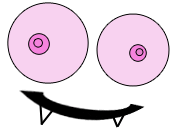Tuesday, November 22, 2005
Cosmos
I used to watch Cosmos with my dad when I was young. I am thrilled to see it on the Science Channel again, not only because I remember the time I spent with my dad, but because it is a great show.
Carl Sagan comments that throughout history, humans have pondered the origin of the cosmos, but "ours is the first generation with a chance at finding out the real answer." The show looks dated, Sagan has funny hair and wears turtlenecks, but the questions he asks are as important as they have ever been. It is tempting to not ask those questions, and there are some who think that to even ask is the height of heresy, which depresses me. I love that, for a time, an advocate for inquiry and scientific thinking was actually part of the public consciousness. Carl Sagan was spoofed by Johnny Carson; proof that he made an actual impact.
The current debate over evolution vs. creationism, and the fact that so many people don't care that science is being whittled out of our schools makes me wonder if this generation really will find out where we came from. Dressing up creationism by calling it "intelligent design" does not make it scientific and objective. Eliminating myth and religion from the human experience does not "prove" science. One of the fantastic things about Cosmos is that it finds ways to relate natural phenomena to how people experience them: the episode I saw this evening talked about Hindu mythology and how the dance of Shiva represents the cyclic creation and destruction of the universe. He points out that modern cosmology is simply a new mythology, which asks the same questions mystics and religious people have been asking for as long as people have existed. If there was an origin to the universe, and if there was a creator, how did the creator come into being? Why not assume there was never a beginning and that matter has always been there? Wouldn't that be easier?
People seem to want easy answers, but how can there be easy answers if we don't even bother to ask the questions?
Carl Sagan comments that throughout history, humans have pondered the origin of the cosmos, but "ours is the first generation with a chance at finding out the real answer." The show looks dated, Sagan has funny hair and wears turtlenecks, but the questions he asks are as important as they have ever been. It is tempting to not ask those questions, and there are some who think that to even ask is the height of heresy, which depresses me. I love that, for a time, an advocate for inquiry and scientific thinking was actually part of the public consciousness. Carl Sagan was spoofed by Johnny Carson; proof that he made an actual impact.
The current debate over evolution vs. creationism, and the fact that so many people don't care that science is being whittled out of our schools makes me wonder if this generation really will find out where we came from. Dressing up creationism by calling it "intelligent design" does not make it scientific and objective. Eliminating myth and religion from the human experience does not "prove" science. One of the fantastic things about Cosmos is that it finds ways to relate natural phenomena to how people experience them: the episode I saw this evening talked about Hindu mythology and how the dance of Shiva represents the cyclic creation and destruction of the universe. He points out that modern cosmology is simply a new mythology, which asks the same questions mystics and religious people have been asking for as long as people have existed. If there was an origin to the universe, and if there was a creator, how did the creator come into being? Why not assume there was never a beginning and that matter has always been there? Wouldn't that be easier?
People seem to want easy answers, but how can there be easy answers if we don't even bother to ask the questions?
Labels: Carl Sagan, Cosmos, creationism, Dad, evolution, intelligent design, mythology, religion, science


